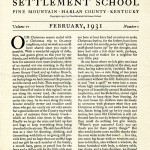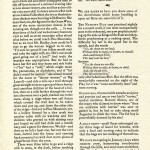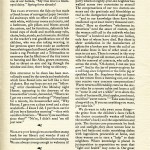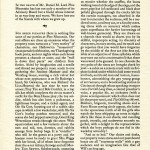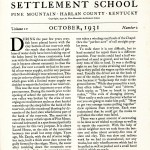Pine Mountain Settlement School
Series 17: PUBLICATIONS PMSS
NOTES 1931
February and October
NOTES – 1931
“Notes from the Pine Mountain Settlement School”
February and October
GALLERY: NOTES – 1931 February
…[L]ight and health cannot really come until economic conditions change; until it is no longer profitable to make whisky, until the glamour of moonshine is replaced by another absorbing interest, and until men here can earn a decent living for families by decent means.
- NOTES – 1931 February, page 1. [PMSS_notes_1931_feb_001.jpg]
- NOTES – 1931 February, page 2.[PMSS_notes_1931_feb_002.jpg]
- NOTES – 1931 February, page 3.[PMSS_notes_1931_feb_003.jpg]
- NOTES – 1931 February, page 4.[PMSS_notes_1931_feb_004.jpg]
TAGS: NOTES – 1931 FEBRUARY: distributing Christmas gifts to community, Nativity Play, Christmas decorations, spring in January, landscaping, the family, student obligations, week-day schedule, religious life, home life, industrial training, academic ideals, medical program, recreation, extension work, overview of buildings, Greek house, cleanliness, stamp book, extension workers, doctors, Daniel M. Lord, parties, property room, charades, stunts, plays
TRANSCRIPTION: 1931 February
P. 1
NOTES FROM THE
PINE MOUNTAIN
SETTLEMENT SCHOOL
PINE MOUNTAIN * HARLAN COUNTY * KENTUCKY
Copyright, 1931, by Pine Mountain Settlement School
Volume IV FEBRUARY, 1931 Number 1
OUR Christmas season ended with a Christmas trip to far-away neighbors, a day we wish you could have shared since you made it possible. With a wonderful supply of dolls, toys, and games given us this year by our friends, and with the gifts made by each child here for someone even more destitute, three of us started out one morning in the final flurry of a snowstorm on a sixteen-mile ride down Greasy Creek and up Gabes Branch, carrying a knobby Christmas with us. Into six burlap bags we had crammed the presents and the candy and fruit. Then atop our bulging bags and our beasts (Santa Claus has to avail himself of mules in this region!) we set out along the snowy road, the mountains around us violet from shadows on the snow under the trees. As we went along, the roads became steadily wetter and muddier until those who got our candy ate not only sweets but a good sediment of the County road with a layer of moisture from Greasy Creek — which we forded nine times in four miles. Finally we let go the reins and held up feet and bags to keep everything from being drenched in the stream. The old idea of Christmas as a time for shooting, drinking, and dynamiting with little or no giving still prevails here, and we hope that our stuffed bags and our gift for each member of the family, a mouth harp, game, or pencil box for the boys and a doll or crib for the little girls may help to change the old conception to one of Christmas as a time of gifts. In this year of hard times, too, the children whose homes…
…are bare at best have had no extras to make Christmas festive, for the fathers have been out of work for months, some with “gyarden stuff plumb burnt up” by the drought, and have had only a few days’ work, perhaps, hauling coal or fodder for a neighbor for very little pay.
At one home where we left gifts two least ones, twins, appeared shyly at the door, and then, having taken us in, vanished. But we took one in, too — a cute thing of two years in a green-black dress to her ankles and a red sunbonnet without the frill. Invited to come in and “rest a spell” we went into a room whose high mantelpiece was covered with a long row of beautifully canned blackberries, raspberries, and huckleberries, stored right at the fire to keep them from freezing. At the next house the children were obviously so overcome with pleasure when they saw Christmas arriving in our sacks (two weeks late, Santa being held up by icy roads and storms, but since Old Christmas is still celebrated here he can do belated visiting) that they could do nothing but grin widely. “Where’s your manners? Can’t you say thank you for them pretty things?” But who would desire more audible thanks than the even wider smile that came! … In a tiny, one-room log house with no windows and a lean-to kitchen, also without a window, the house furnished with beds, a rickety table, two chairs, and a huge fireplace, we thawed out from a fall into the January water of Gabes Branch into which two of us had slipped at lunch time. But the ceiling was so low…
[1]
P. 2
Mr. Hadley could not stand up straight — and certainly he was in a sorry plight, soaked to the knees, with no chair, he could neither sit nor stand. The woman who asked us in, however, built a roaring fire and dried us out, while she talked of how “Hit was a sure pretty place when the ivy (laurel) bloomed in spring” and of how she and other young girls used to slip off from home of a summer evening (she is now about twenty-one and has as her eldest a six-year-old) to dance sets on a flat rock above Gabes Falls when the ivy or rhododendron thickets were bursting with flowers. She described, too, the figures for the Ocean Wave, one of the more uncommon dances in the running set, though not the calls… It was then three o’clock and we had many homes to visit as well as seven mountain miles ahead of us before we could reach Pine Mountain, but as we (not Mr. Hadley, how could he!) rose to go the woman begged us to stay. “I’d sure be proud if you fellers would stay and take the night with me. Hit’s not much good going out of a bad!” And truly the weather was unpropitious. But we had to leave her fire and tiny home and sick baby — (“hit” had a “cold,” which might mean flu, pneumonia, or diphtheria, and if “hit didn’t mend by mornin” she aimed to send for the nurse or “doctor woman” at Big Laurel) and ride a mile up a trail through great straight trees to a group of three homes and countless children at the head of a hollow, then on a mile farther through the very late afternoon over a path, marked out in the snow, along a ridge where two rail fences which crossed the trail had to be taken down and put up, and down the other side of the ridge — but not to Pine Mountain yet. In a hollow formed by a tiny creek was another cabin with no windows and five children who greeted us with shining eyes and hoped we still had dolls and a mouth harp and a game for them too. We did — and then as we left a least one, but not the very least, darted into the house and running back presented us with four warm pieces of gingerbread from the oven.
There were three miles to go and a ridge still to cross, in the dark, before reaching home; but the road was outlined with snow, the stars shone in the water and mud, and all mountain “beasts” can see by night. With warm gingerbread, packs so lean they almost reached the mud below, and the friendliness of the day to brood over, our weariness, lateness, and chilled feet did not trouble us. “I know not how it is,” said one of Dr. Johnson‘s friends to him, “I hear that you have become a philosopher. I too have tried to be but cheerfulness keeps breaking in upon me.” We were this friend!
***
WE ARE EAGER to have you share some of the cheerfulness which keeps breaking in upon us! Here are some bits of it.
THE NATIVITY PLAY cast practised nightly for a month until, if one went unexpectedly soon to the rehearsal, one saw prophets striding up the aisle as Kings of the East and shepherds prophesying at a rushing speed. The difficulty lay not in the speed but in the speech, and the words
“Yes, the sheep are lauf;
Without them no wauf, no hoame, no chauld.
And cauld though hit be,
This lauf suits me best,”
became
“Yes, the sheep are our life;
Without them no wife, no home, no child.
And cold though it be,
This life suits me best,”
only after laborious effort. But the effort was wonderfully rewarded on the night of the Play for it was “most excellently done” and most moving.
OUR HOUSES, trimmed with wreaths and pine and pretties and one or two bird’s “nestes,’ needed mistletoe. Rotund Alonzo, one of the many who claimed to know where “they are mistletoe with berries” was sent to gather it, but he had to take along small Augustus to climb the trees. The fat boy is proverbially damned by his size!
A JOLLY SIGHT — small Oscar submerged under three bags of laurel for wreaths, with only a loud and moving voice to indicate that the bags are not walking of themselves.
WE HAVE HAD Spring in January; days when roosters crow, hammering reverberates through the hills, and mud oozes underfoot. “They’se allus pigs in the mountains” and yesterday, in the warm sun in the middle of the County road lay a huge sow, while a few paces farther on was a whole litter of little…
[2]
P. 3
…pigs, the bottom one entirely hidden by mud and family. The warmth of the day thawed not only the ground — and the pigs- – but the boys at work. Early this morning sounded one lusty voice, shouting at the top (or rather, the bottom — since it came from a fifteen- year-old who is dying to be thought out of the gosling stage) of its lungs the words of one of our ballads, “My true love’s a black- eyed daisy.” Spring fever already!
THE CLASS STUDYING the Odyssey has made a Greek house of corrugated paper (wonderful stairways with no effort at all) covered with white, with inner rooms and courts, and a bathroom, gilt pillars and friezes around the atrium, and for furniture, delicately hollowed cups of chalk and marble-soap tubs, chairs, beds, stands, and a fountain. And then to the teacher’s real gratification one of the children, who was also taking weaving, in her precious spare time made an authentic loom of string and cardboard, while two others made a rag Penelope and a Telemachus so enormous that he filled one of the tiny rooms to bursting and like Alice, grown enormous, had to thrust an arm and leg through the window and door, there being no chimney.
OUR STRUGGLE to be clean has been marvellously eased by the towels and washcloths which have flowed into our loft like a river of plenty. But our boys are not yet “following” utter cleanliness! One Monday night Homer, appearing in the doorway of the housemother’s room, demanded, “Where can I get me a towel and washrag?” Nonplussed for a minute, his housemother said, “Why Homer, I gave you a clean towel and a clean washcloth — I know I did. I put them out for all you boys Saturday morning”–then with a sudden intuition — “Haven’t you used them since then?” “No’m, I didn’t need ’em till just now.’
***
WE HAVE JUST been given an excellent stamp book for our library and wonder if any of you have outgrown a collection of rare stamps. We are always young enough to welcome it!
***
IN A CURRENT of moonshining, poverty, arrests, neighborliness, and hospitality our extension workers live, as doctors giving advice and treatment, and as friends exchanging a kettle for carrots, bringing peace between neighbors who have quarreled over the depredations of an old hog, and finding places in Pine Mountain or other schools for the older children.
But who of you have given a New Year’s party which an eighty-year-old neighbor has walked across two mountains to attend! The compensations of our two doctors are many and the gratitude and friendships as real as the disregarded medical suggestions — “and to our knowledge there have been swallowed up at least twenty thousand cartloads.” Here as elsewhere “wholesome instructions” need the sauce of custom, and the women still call in the midwife who has “borned” a hundred and sixty-one babies, only four of whom have died. But there is sheer satisfaction in the manufacture of splints for a broken arm from the rail of an old snake fence in lieu of other wood or a man to cut any. There is reward in the very voice of the grand old woman, sent to Louisville for removal of cataracts, who calls out across the creek, “Oh doctor, I can see you now!” And in the jar of preserves given for a call long since forgotten or the little pig or speckled hen Dr. [Ida] Stapleton finds at home on her return from a morning out, our doctors receive very concrete compensations! Warm returns of friendship come as the doctor rides by a remote cabin and hears a call to “come in and set a while” or to share the lunch of buttermilk, fried apples, cornbread, and fried “sweet taters.” “Take some honey along with ye. If you see anything you want, jest take hit.”
We do want to take away some things — the grime from the children’s faces (which the doctor occasionally washes off behind the mother’s back) and the superstition and pain. The doctors cure pneumonia by fresh air and sunlight, they show women how to give bed baths and make nourishing dishes with ingredients procurable at home, and these women are in turn a “holp” to their neighbors. Where knowledge is placed in juxtaposition to superstition we trust that “light and health” may come in. Our great hope, of course, lies in the education of our own children, two of whom are now taking their first year of medical work.
[3]
P. 4
But light and health cannot really come until economic conditions change; until it is no longer profitable to make whisky, until the [glamour] of moonshine is replaced by another absorbing interest, and until men here can earn a decent living for families by decent means.
***
IN THE DEATH of Mr. Daniel M. Lord Pine Mountain has lost not only a member of its Advisory Board but a friend whose interest in us was deep and warm. We have lost one of the friends with whom we grew up.
***
FOR SHEER PLEASURE there is nothing like some of our parties at Pine Mountain. Our real affairs are dress up occasions when the property room turns out a “very motley” of characters; our Hallowe’en “massacred” (masquerade) celebration, our Thanksgiving book party, and our nights when each house presents a charade or stunt, and the “wall is down that parts” our children from fiction. Aided by imagination and a needle and thread our property room sends to one gathering the Ancient Mariner and the Wedding Guest, wearing a rich velvet hat whose next appearance is on Sir Roderigo’s head; Sir Gawayne, who was Richard the Lion-Hearted the last time he wore the armor; Tiny Tim and Bob Cratchit, in a top silk hat which completes the circus master’s outfit for the Boys House play; the toy soldier, which has also been a policeman, a lighthouse keeper, and a ticket agent; and Ole Sis Cow, bursting out of a rabbit skin cape in which a few weeks later, with Ole Sis Cow’s burlap patches removed and the seams she had popped sewed up, Good King Wenceslaus treads through the snow. With equal realism and a few variants about the ears and tail, rats, dormice, and rabbits emerge from burlap bags. It is “ontellin'” who will be the guests at a party and the hostess must be ready to greet Mrs. Wiggs with her brood, all of whom have forgotten their the-a-ter tickets; Scrooge and old Morley; Tom Sawyer, Scheherazade, stumping Long John Silver, Brer Rabbit, Queen Guinevere, and Ma in her kerchief and I in my cap — with noses like cherries.
“But the Play’s the thing,” when we gather in the Assembly Room “of a Saturday night” for two hours of mirth. Through the ratiné curtain come just enough foreshadowings of the Commedia dell’ Arte to follow to make us wonder whether the snuffles, the boots walking round at the edge of the stage, and the stove-pipe hat (of cardboard and black shoe polish) glimpsed through the cracks left by the curtain managers, too absorbed in the cast to remember the audience, will be a medieval scene, a railway car, or a faculty meeting (done with an accuracy which makes quite superfluous the furtive borrowings of well-known garments). They are drawn on a charade that would so charm you by its skillful, impromptu acting, its diversity of characters, its racy stories, and its touch and go repartee that you would have forgotten by the middle of the first act (the first syllable of an adjective of three syllables which may turn out to be consternation!) that there was a word to be guessed. In one charade the two poles of the times are brought cheek by jowl — a cabin on a remote creek with its fireplace (a desk under which is laid some wood) and beds, and its old man and ‘ooman, in sun-bonnet, admonishing the gay young group of set runners; and a broadcasting station in Cincinnati through whose speaking trumpet come For Old Lang Zion, a colored preacher’s voice, a popular hit, an orchestra (with a piano accompaniment which often does not hit the proper note), and The Old Gray Myrrh. Robbers, brigands, travelling shows and a Farm House sewing circle appear, the latter to the uproarious mirth of all the girls who watch the boys whipping up rents in night-shirts like those in our sheets; and mending patch, overalls, and underwear securely together, with a delight in the representation which the boys perhaps do not feel in the weekday actuality!
“And so to bed.” Our chairs and desks, our property room stores and our pasteboard boxes are all “courteous walls” with a gay audience and an imagination like that of Will’s so long ago.
[4]
The Marchbanks Press, New York
GALLERY: NOTES – 1931 October
This year, in order to eliminate the worry and care which goes with a limited water supply we decided to repair the bottom of our reservoir.
- NOTES – 1931 October, page 1. [PMSS_notes_1931_oct_001.jpg]
[images for pages 2 through 4 are not available.]
TAGS: NOTES – 1931 OCTOBER: crayfish, reservoir repair, drought, Mr. [Luigi] Zande, Wisconsin Steel Company, garden crops, opening day, Open House, schoolhouse, party night, curriculum, agriculture courses, Denmark, Mr. [Peder] Moller, cooperatives, ambulance squad, vesper service, Bible courses, Sunday service, Line Fork Settlement, Labor Day picnic, Mr. [Robert] Stapleman, financial statement
TRANSCRIPTION: 1931 October
P. 1
NOTES FROM THE
PINE MOUNTAIN
SETTLEMENT SCHOOL
PINE MOUNTAIN * HARLAN COUNTY * KENTUCKY
Copyright, 1931, by Pine Mountain Settlement School
Volume IV OCTOBER, 1931 Number 2
DURING the past few years cray-fish have played havoc with the clay bottom of our reservoir with the result that thousands of gallons of water daily have been leaking out of the holes bored by these crustaceans. Last year with the drought as an additional handicap it became almost necessary to close the school. For over a month we had to be careful of our water supply, and for any purpose other than drinking it was rationed out. This year, in order to eliminate the worry and care which goes with a limited water supply we decided to repair the bottom of our reservoir.
This was the most important event of the past summer. During the month prior to the opening of school the quietness of this narrow valley was broken by the cries of men urging on [recalcitrant] mules as they hauled materials up the steep hill to the bank of the reservoir, and the occasional blasting by dynamite of the hard slate which forms part of the bank of the reservoir. The reservoir is one of the many artistic spots of Pine Mountain and is situated in a spot formed perfectly by nature for this very purpose. It is above Laurel House, on the side of the mountain between two small but steep ridges. Years ago, Mr. [Luigi] Zande, with the aid of some neighbor men, built a thick stone dam across the gully formed by the ridges. There, the water, after tumbling down the mountain over rocks and thru little underground passages, comes to rest in a shady pool of aqua-marine surrounded by trees of all kinds and shapes. It is truly a beautiful spot. And to get there one takes a winding road back of the Chapel thru the “perfect acre” of tall straight poplar trees.
To walk there it is not difficult, but to haul material for repair there is a different question. Four mules could haul a half wagon-load of sand or gravel, and we had seventy tons of this to haul. It was a thrilling sight to see four mules straining and sweating as they pulled the wagon up this winding road. Usually the driver sat on the back of one of the mules and drove from this position because it “holps keep the mule to the ground better.” While they paused for a rest, they often talked “mules” and “drivers.” Such topics as “How to break in young mules,” “The evils of changing drivers,” “How easily a mule can discover whether or not you are going to make him pull,” “How to get two strange teams pulling together” drew opinions from everyone. Each man maintained that he could get the mules to pull when the other man failed.
There was a great amount of excavating to be done as we wished to enlarge as well as to repair the reservoir. With the help of eleven neighbor men we took from the bottom and sides about seventy-five tons of slate and clay. This was slow and tedious work for we had no steam shovel, nor any trucks, but only wheelbarrows which had to be pulled as well as pushed and a small hand derrick which we made.
After three weeks of digging, blasting, and hauling, we were ready to “cut” the concrete. All things so far had been leading up…
[1]
[images for pages 2 through 4 are not available.]
Previous:
NOTES – 1930
Next:
NOTES – 1932
See Also:
DRAMA Guide
EVENTS Guide
RESERVOIR
Return To:
NOTES Index

